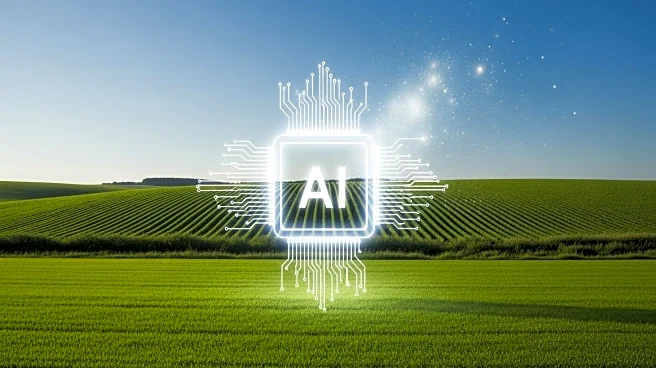What's Happening?
China Agricultural University has introduced the Shennong Large Model 3.0, a comprehensive artificial intelligence model designed to revolutionize agricultural practices. This model, unveiled at the 2025
World AgriFood Innovation Conference in Beijing, is the first large-scale AI system in China trained with the country's largest agricultural dataset. Covering 90% of agricultural disciplines and 80% of scenarios, the model aims to enhance crop breeding, planting, and livestock production. The Shennong AI Agent Platform, accompanying the model, offers practical applications for farmers, including pest and disease identification and crop management guidance. The model is currently being tested in various regions, with over 100,000 active users benefiting from its capabilities.
Why It's Important?
The launch of the Shennong Large Model 3.0 represents a significant advancement in agricultural technology, potentially increasing productivity and efficiency in farming practices. By providing farmers with AI-powered tools for crop management and pest control, the model can help reduce reliance on traditional methods and improve decision-making processes. This development is crucial for addressing food security challenges and supporting sustainable agricultural practices. The model's ability to accelerate scientific discovery and assist in data-driven breeding decisions could lead to more resilient and innovative agrifood systems, benefiting both local and global agricultural sectors.
What's Next?
The Shennong Large Model 3.0 is expected to expand its reach and application across more regions in China, with ongoing testing and user feedback driving further improvements. As the model gains traction, it may influence global agricultural practices, encouraging other countries to adopt similar AI-driven solutions. The continued development of intelligent agents within the model could lead to more specialized applications, enhancing its utility for farmers and researchers. Additionally, collaborations with international agricultural research groups may foster innovation and knowledge exchange, further advancing the field of agricultural AI.
Beyond the Headlines
The introduction of AI in agriculture raises ethical and cultural considerations, particularly regarding the displacement of traditional farming methods and the potential impact on rural communities. Ensuring equitable access to AI technology and addressing gender gaps in agricultural innovation are critical for inclusive growth. The model's focus on small size, high intelligence, and low cost aims to make AI more accessible, but ongoing efforts are needed to ensure that all farmers can benefit from these advancements. Long-term, the integration of AI in agriculture could lead to shifts in labor dynamics and require new skill sets for farmers.










